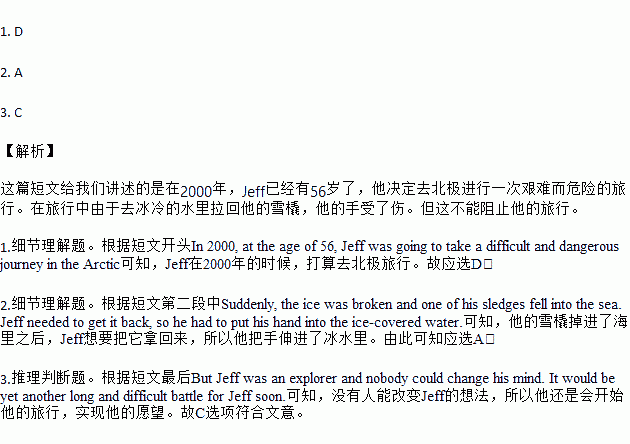题目内容
In 2000, at the age of 56, Jeff was going to take a difficult and dangerous journey in the Arctic. He was planning to walk to the North Pole all by himself, pulling his food, tent and other things behind him in two sledges (雪橇). Because the Arctic is covered with ice and water, he would sometimes have to sit on his sledges and use them like a boat.
Jeff was seven days into his journey in the Arctic. It was dark and terribly cold ( -35℃ ).In face of this terribly low temperature, he had made good progress across the ice. Suddenly, the ice was broken and one of his sledges fell into the sea. Jeff needed to get it back, so he had to put his hand into the ice-covered water. Once he had got the sledge back, Jeff put up his tent, lit a fire and tried to warm up his cold hand. It was no help--his hand was seriously hurt as it had been in the cold for so long. He radioed for help, and an airplane was sent to save him. Finally, he arrived at a hospital in Canada. The doctors there said he hurt his left hand in the icy water. They saved his hand and advised him not to travel to the North Pole any more.
But Jeff was an explorer and nobody could change his mind. It would be yet another long and difficult battle for Jeff soon.
1.Jeff was planning to walk to the North Pole all by himself in
A. 1970 B. 1972 C. 1998 D. 2000
2.After one of his sledges fell into the sea, what did Jeff do first?
A. He put his hand into the water. B. He lit a fire near the tent.
C. He warmed up his hand. D. He put up his tent.
3.What can we infer (推断) from the last sentence of the article?
A. Jeff would practice more for the next journey.
B. Jeff would explore another part of the Arctic.
C. Jeff would try his best to realize his wish.
D. Jeff would refuse to take any advice.
 天天向上一本好卷系列答案
天天向上一本好卷系列答案 小学生10分钟应用题系列答案
小学生10分钟应用题系列答案
